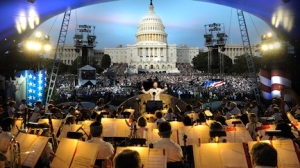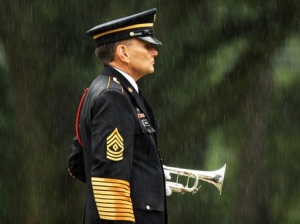The Well-Tempered Ear
YOU MUST HEAR THIS: No piece captures the mixed emotions of Memorial Day better than Charles Ives’ “Decoration Day”
3 Comments
PLEASE HELP THE EAR. IF YOU LIKE A CERTAIN BLOG POST, SPREAD THE WORD. FORWARD A LINK TO IT OR, SHARE IT or TAG IT (not just “Like” it) ON FACEBOOK. Performers can use the extra exposure to draw potential audience members to an event. And you might even attract new readers and subscribers to the blog.
By Jacob Stockinger
Today is Memorial Day, 2022.
It is the annual holiday to remember those who died in military service to the country. (Below are flags placed each year at the tombstones in Arlington National Cemetery in Virginia.)
If you want to honor survivors and current service members, that would be Veterans Day on Nov. 11.
All weekend long the radio has been playing music and the television has been showing war movies.
A lot of the music is familiar and repeated every year: Sousa marches and Morton Gould suites, elegies by Gustav Mahler, Samuel Barber, Aaron Copland and Leonard Bernstein; requiems by Mozart and Fauré; a hymn by John Williams and other movie scores. This year has also seen the playlist include rediscovered works of homage by African-American composers such as William Grant Still.
But only this year did The Ear finally hear — thanks to Wisconsin Public Radio — the one piece that, to his mind, best captures Memorial Day with its blending of consonance and dissonance, its mix of major and major keys, of familiar or “found” music and original music.
It is called, simply, “Decoration Day” and it was composed in 1912 — but not published until 1989 — by the 20th-century iconoclastic and early modernist American composer Charles Ives (below, 1874-1954). It ended up as part of a work the composer called “A Symphony: New England Hollidays.”
See if you agree with The Ear.
Listen to the 8-minute performance by “The President’s Own” United States Marine Band in the YouTube video at the bottom.
Listen to the deep anguish and and sense of loss conveyed in the opening, when a solemn remembrance procession goes to a cemetery to plant flags and lay flowers and wreaths to “decorate” the graves of the fallen.
Listen carefully and you will hear a faint version of “Taps” and ringing church bells in the atmospheric music.
Then as so often happens in reality, life suddenly intrudes in the form of a celebration by a loud marching brass band as it leaves the cemetery for the celebratory marches, picnics and fireworks.
But at the end, the darkness briefly returns. The sense of loss lingers long after the actual death and long after the holiday has been celebrated.
There is no closure.
Just resignation.
Just living with loss.
Here is the background from Wikipedia about how the holiday started as Decoration Day after the Civil War and when it evolved into Memorial Day in 1970: https://en.wikipedia.org/wiki/Memorial_Day
And here is biographical background, with the actual sources and depictions of “Decoration Day” — just go down the page to compositions and click — about Charles Ives: https://en.wikipedia.org/wiki/Charles_Ives
Did you know and like Charles Ives’ music?
Does “Decoration Day” impress or move you?
What music most embodies Memorial Day for you?
The Ear wants to hear.
Tags: #AaronCopland, #African-AmericanComposer, #ArlingtonNationalCemetery, #BandMusic, #BlackAmericans, #BlogPost, #BlogPosting, #BrassBand, #BrassMusic, #CharlesIves, #ChurchBells, #CivilWar, #DecorationDay, #FacebookPosting, #GabrielFaure, #GustavMahler, #JacobStockinger, #JohnPhilipSousa, #JohnWilliams, #LeonardBernstein, #MajorKey, #MemorialDay, #MilitaryService, #MinorKey, #MixedEmotions, #MortonGould, #NationalPublicRadio, #NewEngland, #OrchestralMusic, #OriginalWork, #SamuelBarber, #TheEar, #ThePresident, #TheU.S., #UnitedStates, #UnitedStatesMarineBand, #USMarines, #VeteransDay, #WarMovies, #Wikipediaentry, #WilliamGrantStill, #WisconsinPublicRadio, #WolfgangAmadeusMozart, #YouTubevideo, 20th-century, 20th-century music, Aaron Copland, actual, African American, American, American Civil War, Ameriuca, anguish, annual, Arlington, Arlington National Cemetery, Arts, atmosphere, atmospheric, audience, background, band, band music, Barber, Bernstein, biographical, black, blog, bottom, brass band, brass music, celebration, celebratory, cemetery, Charles Ives, church, church bells, Civil War, Classical music, Classical Revolution, closure, compose, composer, Composition, Concert, consonance, Copland, darkness, dead, death, Decoration Day, deep, depiction, dissonance, early, Early music, Elegy, embody, emotion, evolution, evolve, Facebook, fallen, familiar, Fascebook, Faure, film, Fireworks, flag, flower, found, Gabriel Fauré, Gould, grave, Gustav Mahler, hear, Holiday, homage, honor, hymn, iconoclast, iconoclastic, impress, information, intrude, Ives, Jacob Stockinger, John Philip Sousa, John Williams, Leonard Bernstein, life, like, linger, listen, living, loss, loud, Mahler, major key, march, Marines, mark, Memorial Day, military, minor key, minute, mixed, modern, modernist, morph, Morton Gould, move, Movies, Mozart, nation, national, National Public Radio, New England, NPR, opening, orchestral, original, performance, picnic, piece, plant, playlist, post, posting, President, procession, psalm, publish, Radio, reality, rediscover, remembrance, repeat, Samuel Barber, score, sense, service, show, solemn, soundtrack, source, sources, Sousa, Still, suddenly, Suite, symphony, Taps, Television, thanks, The Ear, TV, U.S., United State Marine Band, United States, veterans, Veterans Day, video, war, war movies, weekend, Wikipedia, William Grant Still, Williams, wisconsin public radio, Wolfgang Amadeus Mozart, work, wreaty, year, you, YouTube
Classical music: On this Memorial Day, The Ear honors not only soldiers but also civilians, COVID-19 victims and all those responders and workers who serve the public
4 Comments
PLEASE HELP THE EAR. IF YOU LIKE A CERTAIN BLOG POST, SPREAD THE WORD. FORWARD A LINK TO IT OR, SHARE IT or TAG IT (not just “Like” it) ON FACEBOOK. Performers can use the extra exposure to draw potential audience members to an event. And you might even attract new readers and subscribers to the blog.
By Jacob Stockinger
Today is Memorial Day 2020.
It is of course a largely military holiday. Most of the planned public events will be to honor those who died in service to their country. That usually means fallen soldiers and deceased veterans.
It also means that military cemeteries – like Arlington National Cemetery, below — will be decorated with American flags.
But The Ear doesn’t think we should forget that there are many ways to serve your country and protect the public, many kinds war and self-sacrifice.
Let’s not forget civilians, especially since worldwide more than twice the numbers of civilians died in World War II than did members of the armed forces. Lives are taken as well as given.
A larger definition of “national service” also seems especially timely since this weekend the U.S. is likely to surpass 100,000 deaths from COVID-19 during the coronavirus pandemic. They include many first responders and frontline workers (below) as well as grocery store workers and delivery drivers. Even “small” occupations have big heroes. There is no reason not to be more inclusive.
There are traditional kinds of music to honor the dead. They include requiems and elegies, military marches and funeral marches. And in the comment section you should feel free to suggest whatever music you think would be appropriate.
But The Ear found a piece he thinks is both unusual and ideal.
It is called “Old and Lost Rivers” by the contemporary American composer Tobias Picker (below). It is a beautiful, moving and contemplative piece, based on an actual place in Texas, that you can hear in the YouTube video at the bottom.
But you should know this about the work’s title.
With rivers, “lost” doesn’t mean forgotten or misplaced.
One dictionary defines it as “a surface stream that flows into an underground passageway” – and eventually often becomes part of a larger body of water such as a lake or the ocean.
It can also mean rivers that appear during heavy rain and then disappear when they evaporate during a drought.
Somehow, those images serve as fitting metaphors for our losses and that music seems a very appropriate way to honor those who sacrifice themselves and disappear in service to others.
The Ear hopes you agree.
Tags: #AmericanComposer, #ArlingtonNationalCemetery, #ArmedForces, #BlogPost, #BlogPosting, #ContemporaryComposer, #COVID-19, #DecorationDay, #FacebookPost, #FacebookPosting, #FirstResponder, #FrontlineWorker, #GroceryStore, #JacobStockinger, #MemorialDay, #NationalService, #NewMusic, #OldandLostRivers, #TheEar, #TheU.S., #TobiasPicker, #TraditionalMusic, #WorldWar2, #WorldWarII, #YouTubevideo, America, American, appropriate, Arlington National Cemetery, armed forces, Arts, audience, beautiful, big, blog, cemetery, civilian, composer, contemplative, contemporary, country, covid, dead, death, deceased, decorate, Decoration Day, delivery, die, disappear, driver, drought, evaporate, event, Facebook, fallen, first responder, first responders, fitting, flag, forgotten, forward, frontline, funeral march, give, grocery store, hear, hero, Holiday, honor, ideal, image, inclusive, Jacob Stockinger, lake, like, link, lives, loss, losses, lost, Madison, march, Memorial Day, metaphor, miliary, misplaced, moving, Music, national service, New Music, occupation, ocean, old, Old and Lost Rivers, Orchestra, pandemic, passageway, peformer, piece, planned, post, posting, protect, public, rain, Requiem, river, sacrifice, self-sacrifice, serve, service, share, small, soldier, suggest, surface, surpass, symphony, tag, take, Texas, The Ear, Tobias Picker, traditional, U.S., underground, United States, unusual, Veteran, war, way, weekend, worker, World War 2, World War II, YouTube
Classical music: Here is music to mark Memorial Day. What pieces would you choose?
6 Comments
By Jacob Stockinger
Today is Memorial Day 2017, when those soldiers who died in war and service to their country are honored. (Below is an Associated Press photo of the National Cemetery in Washington, D.C.)
Many blogs, newspapers and radio stations list classical music that is appropriate for the occasion.
But one of the very best compilations that The Ear has seen comes this year from Nashville Public Radio.
Perhaps that makes sense because Nashville is such a musical city.
Perhaps it has to do with other reasons.
Whatever the cause, this list gives you modern and contemporary composers and music (John Adams, Joseph Bertolozzi and Jeffrey Ames) as well as tried-and-true classics (Henry Purcell and Edward Elgar, Franz Joseph Haydn and Frederic Chopin).
It even features some music that The Ear is sure you don’t know.
Take a look and many listens:
Do you agree with the choices?
Do you like them or at least some of them?
Which ones?
Which music would you choose to mark today?
Leave a name and, if possible, a link to YouTube in the COMMENT section.
The Ear wants to hear.
Tags: AP, Arlington National Cemetery, Arts, Associated Press, Baroque, blog, casualty, Cello, cemetery, Chamber music, choral music, civilian, classic, Classical music, compilation, composer, contemporary, country, dead, death, Elgar, Holiday, Jacob Stockinger, Jeffrey Ames, Johann Sebastian Bach, John Adams, Joseph Bertolozzi, loss, Ludwig van Beethoven, Madison, Memorial Day, memory, military, modern, Mozart, Music, Nashville, national, National Public Radio, Newspaper, NPR, opera, Orchestra, peace, photo, Purcell, Radio, remembrance, service, soldier, Sonata, symphony, Tennessee, United States, University of Wisconsin-Madison School of Music, University of Wisconsin–Madison, Veteran, veterans, vocal music, war, Wisconsin, Wolfgang Amadeus Mozart, YouTube
Classical music: For Memorial Day – and as a tribute to all veterans — here is the long and moving history of “Taps” from NPR.
6 Comments
By Jacob Stockinger
In past years, I have posted works of classical music that pay tribute to veterans, their families and those whose suffering we recall and remember on Memorial Day. (Below is a photo of Arlington National Cemetery.)
Here is a link to the Memorial Day posting for 2011:
https://welltempered.wordpress.com/2011/05/30/
Here are links to two Memorial Day postings for 2010:
https://welltempered.wordpress.com/2010/05/
In addition, the National Memorial Day Concert – with hosts Joe Mantegna and Gary Sinise — that was broadcast LIVE last night (Sunday) from the west lawn of the Capitol in Washington, D.C., on Wisconsin Public Television will get an encore presentation tonight at 10:30 p.m. The National Symphony Orchestra will take part. It performs Samuel Barber‘s “Adagio for Strings,” among other works.
Here are links to information about that TV broadcast:
http://www.pbs.org/memorialdayconcert/concert/
http://wptschedule.org/schedulenow.php?epid=220691&stime=2012-05-28
But this year I happened upon something else: An extraordinary history on NPR of the moving, emotionally intense bugle call TAPS that will be played many times in many places today.
It is both a personal story of a longtime military bugler for Arlington National Cemetery and a history of a piece of music that spans 150 years, and wears and conflicts going back to the Civil War and more recently the assassination of JFK.
Here is a link to the story:
http://www.npr.org/blogs/deceptivecadence/2012/05/18/152939191/150-years-of-taps
But I am also not ignoring classical music. If I recall correctly, Leonard Bernstein once commented on how Beethoven used various bugle calls in his Symphony No. 3, the famed “Eroica” that also has a movement that is a “Funeral March for a Hero.” (Part of the technical explanation, I seem to recall, is that the symphony is written in the key of E-flat, which is often the key for brass and especially horns and trumpets.)
But I am still interested in what piece of classical music you would choose to listen to on Memorial Day as a tribute to veterans. Leave a comment and let us know.
- May 2024
- April 2024
- March 2024
- February 2024
- January 2024
- December 2023
- November 2023
- October 2023
- September 2023
- August 2023
- July 2023
- June 2023
- May 2023
- April 2023
- March 2023
- February 2023
- January 2023
- December 2022
- October 2022
- September 2022
- June 2022
- May 2022
- April 2022
- March 2022
- July 2021
- June 2021
- May 2021
- April 2021
- March 2021
- February 2021
- January 2021
- December 2020
- November 2020
- October 2020
- September 2020
- August 2020
- July 2020
- June 2020
- May 2020
- April 2020
- March 2020
- February 2020
- January 2020
- December 2019
- November 2019
- October 2019
- September 2019
- August 2019
- July 2019
- June 2019
- May 2019
- April 2019
- March 2019
- February 2019
- January 2019
- December 2018
- November 2018
- October 2018
- September 2018
- August 2018
- July 2018
- June 2018
- May 2018
- April 2018
- March 2018
- February 2018
- January 2018
- December 2017
- November 2017
- October 2017
- September 2017
- August 2017
- July 2017
- June 2017
- May 2017
- April 2017
- March 2017
- February 2017
- January 2017
- December 2016
- November 2016
- October 2016
- September 2016
- August 2016
- July 2016
- June 2016
- May 2016
- April 2016
- March 2016
- February 2016
- January 2016
- December 2015
- November 2015
- October 2015
- September 2015
- August 2015
- July 2015
- June 2015
- May 2015
- April 2015
- March 2015
- February 2015
- January 2015
- December 2014
- November 2014
- October 2014
- September 2014
- August 2014
- July 2014
- June 2014
- May 2014
- April 2014
- March 2014
- February 2014
- January 2014
- December 2013
- November 2013
- October 2013
- September 2013
- August 2013
- July 2013
- June 2013
- May 2013
- April 2013
- March 2013
- February 2013
- January 2013
- December 2012
- November 2012
- October 2012
- September 2012
- August 2012
- July 2012
- June 2012
- May 2012
- April 2012
- March 2012
- February 2012
- January 2012
- December 2011
- November 2011
- October 2011
- September 2011
- August 2011
- July 2011
- June 2011
- May 2011
- April 2011
- March 2011
- February 2011
- January 2011
- December 2010
- November 2010
- October 2010
- September 2010
- August 2010
- July 2010
- June 2010
- May 2010
- April 2010
- March 2010
- February 2010
- January 2010
- December 2009
- November 2009
- October 2009
- September 2009
- August 2009
Archives
- 2,493,291 hits
Blog Stats
Recent Comments
| welltemperedear on What do you think of the… | |
| Scott on What do you think of the… | |
| welltemperedear on Yunchan Lim’s Chopin etudes ar… | |
| bratschespeilerin on What do you think of the… | |
| MARVIN P WICKENS on Yunchan Lim’s Chopin etudes ar… |
Tags
#BlogPost #BlogPosting #ChamberMusic #FacebookPost #FacebookPosting #MeadWitterSchoolofMusic #TheEar #UniversityofWisconsin-Madison #YouTubevideo Arts audience Bach Baroque Beethoven blog Cello Chamber music choral music Classical music Compact Disc composer Concert concerto conductor Early music Facebook forward Franz Schubert George Frideric Handel Jacob Stockinger Johannes Brahms Johann Sebastian Bach John DeMain like link Ludwig van Beethoven Madison Madison Opera Madison Symphony Orchestra Mead Witter School of Music Mozart Music New Music New York City NPR opera Orchestra Overture Center performer Pianist Piano post posting program share singer Sonata song soprano String quartet Student symphony tag The Ear United States University of Wisconsin-Madison School of Music University of Wisconsin–Madison Viola Violin vocal music Wisconsin Wisconsin Chamber Orchestra wisconsin public radio Wolfgang Amadeus Mozart YouTube







